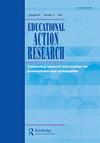批判性友谊对参与合作行动研究的中学生教师的影响
IF 1.2
Q3 EDUCATION & EDUCATIONAL RESEARCH
引用次数: 0
摘要
摘要本研究主要探讨:a)参与合作行动研究的中学生教师如何发挥批判性朋友的作用?b)他们遇到了什么挑战?他们如何缓解这些挑战?c)作为关键朋友的会面在哪些方面影响了实习教师进行合作行动研究的学习?我们研究的参与者包括38名中学学生教师(这里定义为9年级至12年级),他们是位于爱尔兰西部的一所大型研究型大学为期两年的硕士课程的最后一年。这些实习教师被分成11个重要的朋友小组,每组3 - 5人,重点进行关于整合不同教案方法的合作行动研究。四名大学导师就课程计划的主题指导了关键的朋友小组,并提供了三种课程计划模板,包括长表格、短表格和实习教师自己创建的表格。数据是通过小组反馈表、调查和行动研究报告收集的。数据分析需要使用开放编码、重复代码分类和分析备忘录。断言是根据数据中反复出现的趋势生成的。研究结果表明,作为研究人员的实习教师有能力利用从他们的关键朋友群体中收集的资源、技能和知识,以促进他们作为教师和教师研究人员的发展。他们的合作关系有助于确保对彼此和对教学职业本身的信心和尊重。关键词:批判性朋友;合作行动研究;学生教师;布伦达·卡波比安科感谢由美国国务院和爱尔兰富布赖特委员会赞助的富布赖特美国学者项目为本出版物和研究项目提供的财政支持。其内容完全由作者负责,并不一定代表富布赖特项目、美国政府或爱尔兰富布赖特委员会的官方观点。作者还要感谢积极参与本研究的实习教师。披露声明作者未报告潜在的利益冲突。基于课程的活动包括教育科学模块(教与学心理学;教育、多样性和社会正义;爱尔兰教育的历史、结构与脉络教育哲学;专业研究(教与学);课程与评估;包括教学;识字和算术,教育中的信息和通信技术);专业实践(准备;实践教学;教师专业;反思性实践;技术促进学习和资源开发);和两个学科方法论模块。这项工作得到了爱尔兰富布赖特委员会的支持。本文章由计算机程序翻译,如有差异,请以英文原文为准。
The influence of critical friendships on secondary student teachers engaged in collaborative action research
ABSTRACTIn this study, we explore the following: a) How do secondary student teachers, engaged in collaborative action research, function as critical friends? b) What challenges do they encounter? How do they mitigate these challenges? and c) In what ways did meeting as critical friends influence the student teachers’ learning to conduct collaborative action research? The participants in our study included 38 secondary school student teachers (defined here at grades 9 through 12) in the last year of a two-year Masters program from a large, research-intensive university situated in the West of Ireland. The student teachers were organized into 11 critical friend groups of three to five members focused on conducting collaborative action research on the integration of different approaches to lesson planning. Four university supervisors guided the critical friend groups on the topic of lesson planning and offered three lesson plan templates including a long form, shortened form, and a form created by the student teachers themselves. Data were gathered via group feedback forms, surveys, and action research papers. Data analysis entailed the use of open coding, categorization of recurring codes, and analytic memos. Assertions were generated based on recurring trends in the data. Findings indicated that student teachers as researchers have the capacity to leverage the resources, skills, and knowledge gleaned from their critical friend groups to advance their development as teachers and teacher researchers. Their collaborative relationships help ensure a sense of confidence and respect for one another and for the teaching profession itself.KEYWORDS: Critical friendscollaborative action researchstudent teacher AcknowledgmentsDr. Brenda Capobianco gratefully acknowledges financial support for this publication and research project by the Fulbright U.S. Scholar Program, which is sponsored by the U.S. Department of State and Ireland Fulbright Commission. Its contents are solely the responsibility of the authors and do not necessarily represent the official views of the Fulbright Program, the Government of the United States, or the Irish Fulbright Commission. The authors also want to thank the student teachers who actively participated in this study.Disclosure statementNo potential conflict of interest was reported by the author(s).Notes1. Course based activities include a module on Educational Sciences (Psychology of Teaching & Learning; Education, Diversity and Social Justice; History, Structure & Context of Irish Education; Philosophy of Education); Professional Studies (Teaching & Learning; Curriculum & Assessment; Inclusive Teaching; Literacy and Numeracy, ICT in Education); Professional Practice (Preparation; Practical Teaching; Teacher as Professional; Reflective Practice; Technology Enhanced Learning & Resource Development); and two Subject Methodology Modules.Additional informationFundingThe work was supported by the Irish Fulbright Commission.
求助全文
通过发布文献求助,成功后即可免费获取论文全文。
去求助
来源期刊

Educational Action Research
EDUCATION & EDUCATIONAL RESEARCH-
CiteScore
3.10
自引率
8.30%
发文量
48
期刊介绍:
Educational Action Research is concerned with exploring the dialogue between research and practice in educational settings. The considerable increase in interest in action research in recent years has been accompanied by the development of a number of different approaches: for example, to promote reflective practice; professional development; empowerment; understanding of tacit professional knowledge; curriculum development; individual, institutional and community change; and development of democratic management and administration. Proponents of all these share the common aim of ending the dislocation of research from practice, an aim which links them with those involved in participatory research and action inquiry. This journal publishes accounts of a range of action research and related studies, in education and across the professions, with the aim of making their outcomes widely available and exemplifying the variety of possible styles of reporting. It aims to establish and maintain a review of the literature of action research. It also provides a forum for dialogue on the methodological and epistemological issues, enabling different approaches to be subjected to critical reflection and analysis. The impetus for Educational Action Research came from CARN, the Collaborative Action Research Network, and since its foundation in 1992, EAR has been important in extending and strengthening this international network.
 求助内容:
求助内容: 应助结果提醒方式:
应助结果提醒方式:


